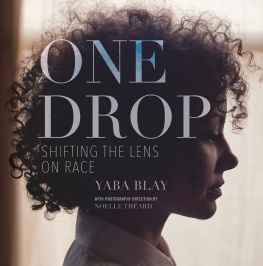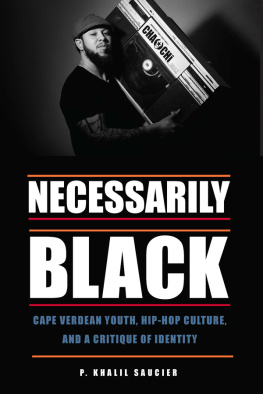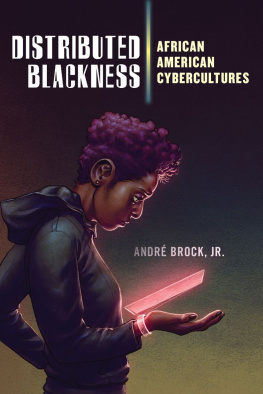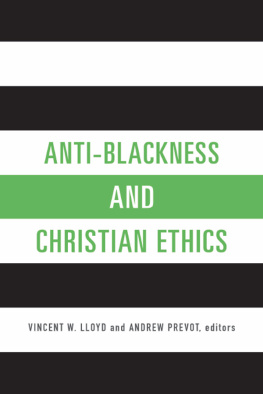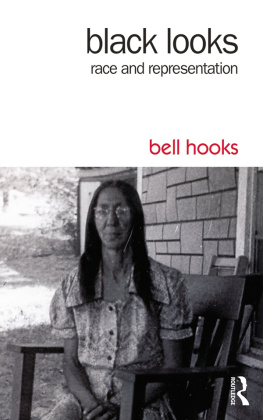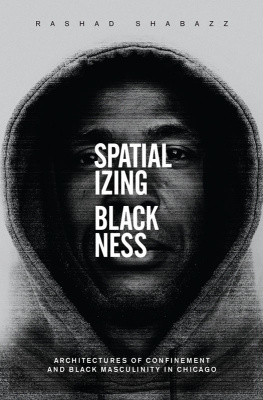Contents
Pagebreaks of the print version
Guide
PRAISE FOR ONE DROP
The one-drop rule has policed life both across and within the color line for centuries. Blay brilliantly and lovingly reframes our visions on the strength and vitality of our visual diversity.
Mark Anthony Neal, author of Looking for Leroy: Illegible Black Masculinities
In this age of Barack Obama and Trayvon Martin, the conversation on the issue of race is sadly still very relevant. I salute Blay for revisiting this ever-growing and thought-provoking discussion.
Jamel Shabazz, photographer, urban anthropologist, and author of Back in the Days
One Drop is an open and honest dialogue that will hopefully begin the shift in our thinking about race and skin color. We are all one human race.
Marc Baptiste, fashion and celebrity photographer
One Drop shatters the notion of a singular or unified Black experience. The first-person accounts... raise a mirror to a new Black America, more diverse and dynamic than ever before.
Margaret L. Hunter, author of Race, Gender, and the Politics of Skin Tone
I want everyone to read One Drop.... Let the complexity of how we see each other and ourselves rise up and conquer the failure of imagination and humanity that is racism.
Bliss Broyard, author of One Drop: My Fathers Hidden Life A Story of Race and Family Secrets
Blay broadens our ideas about what counts as Black and challenges readers to rethink Blackness not only as a category but as an experience.... Not only a must-read but a must-share.
Amy DuBois Barnett, Editor in Chief, Ebony
The world is smaller, what it means to be Black is in flux, and [Blay] helps us understand this process... brilliantly.
Tukufu Zuberi, Lasry Family Professor of Race Relations, Professor of Sociology at the University of Pennsylvania, and host of the PBS series History Detectives
One Drop is a powerful expos into the perception, classification, and identity of people across the vast African Diaspora... Accessible to both the casual reader and scholar alike.
Steven F. Riley, MixedRaceStudies.org
The poignant first-hand accounts read like pages of a personal diary. What emerges is a remarkable book that negotiates the complexities of life stories on race.
Deborah Willis, author of Posing Beauty: African American Images From the 1890s to the Present
It has become quite chic to write off discussions of racial identity as pass. One Drop chin-checks that hasty notion. Hard.
Joan Morgan, cultural critic, writer, and author of When the Chickenheads Come Home to Roost: A Hip-Hop Feminist Breaks it Down
One Drop is a new telling of the consequences of one of Americas oldest pathologies and should be required reading for all who think they get this thing called race.
Ayana Byrd, co-author of Hair Story: Untangling the Roots of Black Hair in America
A gorgeous and evocative book. The reader is brought on a journey exploring both the borders and the depth of the complicated racial category Black.
Imani Perry, professor at Princeton Universitys Center for African American Studies and author of More Beautiful and More Terrible: The Embrace and Transcendence of Racial Inequality in the United States
With each page, another tablecloth in the proverbial Big House is shaken off, and the crumbs of our systematically dismantled cultural identity are powerfully, lovingly, and proudly pieced back together.
Nicole Ari Parker, actor
One Drop is a quintessential milestone in the American identity journey... a profound work of literature, destined to redirect the flow of racial discourse.
Ronald E. Hall, co-author of The Color Complex: The Politics of Skin Color in a New Millennium

To my daughter, Imani,
who was gracious enough to share me with the world so that this project might be completed.
Congratulations on your first book.
Authors Note
black v. Black
Throughout this book, I have chosen to capitalize both Black and White when describing people. Lowercase black and white refer to the colors found in a box of crayons. Uppercase Black and White instead speak to lived, racialized, and politicized identities, and as such, I consider them proper adjectives. By capitalizing the terms, I acknowledge that they constitute groups of people no different in organization than those ethnicities whose names are capitalized, such as African American, Caribbean American, Latino, and the like. I also, however, capitalize the terms Biracial, Mixed, Mixed-race, and Multiracial (as well as Negro and Mulatto when used for historical accuracy) because they too reflect lived identities.
Black is used around the world to signify people of African descent. While it often prefaces a persons ethnicity Black American, Black Brit, Black Puerto Rican, etc. it is also used as an identifier in and of itself. In fact, based on the interviews I conducted, I surmise that Black is likely the preferred self-identifier of many Black people. Whereas African American is now the politically correct term of choice, people of African descent from other regions of the world such as the Caribbean and Latin America are not American, which means they are not African American they are Black. At the most basic level then, capitalization is a matter of reality and respect respect not only for other people but for myself. One of the most basic English writing lessons we learn as children is to capitalize things that are important. My identity is important, and therefore I capitalize it.
Many scholars who capitalize Black maintain that white should remain lowercase because most of the people to whom the term refers do not conceive of themselves in this way. I am not sure that I agree. Although many Whites make reference to their ethnic identity Italian American, Jewish, Irish American, etc. I would argue that most do not. They, like the rest of the racialized world, understand that they are White and not just white. The option that they are offered by the United States Census Bureau, for example, is White, just as the option we are now offered is Black, African American or Negro. Therefore, I have chosen to similarly capitalize White just as I capitalize Black when referring to people.
Beyond capitalization, in sharing contributors personal narratives, I have made a conscious political decision to privilege their self-identity above the conventions of standard written English. For example, whereas the identifying term Colored is antiquated and may in fact offend some people, s name because her name is not an abbreviation. She was named after her maternal grandmother, whose own mother wanted to name her LA but was told by hospital staff that she could not name her child with initials, so she named her Ellie. LAs name fulfills her great-grandmothers wishes and memorializes her grandmothers intended name. There is meaning behind the way each of our 58 contributors chooses to self-identify. Out of respect, their names and other identifying details are written exactly as they expressed (and spelled) them.

